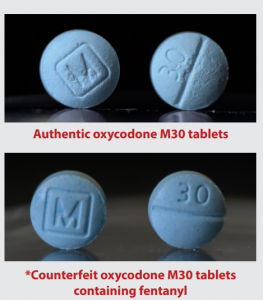Editor’s note: Zach’s last name has been withheld to protect his job and family.
Zach was just over one year into his addiction to opiates when he said he went to buy what he thought were oxycodone pills. It was not until after he had taken the pills that he learned they were all fake. They were laced with fentanyl, and he was immediately hooked.
“After that, heroin didn’t work. Morphine didn’t work. If it wasn’t fentanyl, I wasn’t getting high,” he said.
On Sept. 27, DEA Administrator Ann Milgrim issued a public safety alert addressing an increase in counterfeit prescription pills containing fentanyl and launched the “One Pill Can Kill” campaign.
The announcement warned the American public that these pills are not only widely available and easy to purchase, but also often contain potentially lethal doses of fentanyl.

Photo comparison of authentic vs counterfeit pills. Photo courtesy DEA.
However, the presence of fentanyl is not exclusive to counterfeit pills and has been steadily on the rise over the last 10 years.
“We went to buy what he told us was morphine. Turned out, it was heroin mixed with fentanyl,” Zach said, recounting the time he watched his girlfriend almost die as a result of accidental fentanyl exposure. “I turned on the lights, and she was turning blue a little bit – she’s OD’ing.”
Paramedics arrived on the scene in time to save the young woman’s life, but for the majority of people who unknowingly take fentanyl, the outcome is lethal.
Now considered the deadliest drug in America, fentanyl deaths have increased by over 1,000% between 2011 and 2017.
Fentanyl is a synthetic opioid, originally developed as a pain management option for use in cancer patients and is 80 to 100 times stronger than morphine.
More: DEA Issues Public Safety Alert on Increase of Fake Prescription Pills
According to the Drug Enforcement Administration, drug traffickers mix fentanyl into other drugs like cocaine, methamphetamine and heroin to make it more profitable. By creating a stronger drug with a more powerful high, traffickers can supply customers with a more addictive substance, ensuring repeat business. As a result, more are dying because of accidental overdose, having unknowingly acquired substances containing fentanyl.
In the United States, 53% of accidental overdose deaths are attributed to fentanyl, according to the National Center for Drug Abuse Statistics.
Locally, that number increases dramatically, with 71% of accidental overdose deaths in Richmond and Aiken counties occurring due to fentanyl exposure.
While he could not provide exact numbers for Columbia County, Major Steve Morris of the Columbia County Sheriff’s Office said he spoke with Coroner Vernon Collins who told him that they have experienced numerous overdose deaths, several of which are “suspected to involve fentanyl.” Collins is waiting for results from the crime lab in order to determine a definitive number of fentanyl deaths.
[adrotate banner=”25″]
Sitting at his dealer’s house, Zach nearly became one of the numerous lives lost to drugs altered by traffickers trying to create a stronger, more profitable product.
Already high on Xanax and morphine, Zach was offered a new drug his dealer had purchased off the dark web. His dealer told him it was a new, chemically altered fentanyl that would produce a high like he had never experienced.
“The only question I asked him was, ‘Is it going to kill me?’” Zach said. “He said, ‘I’m going to cut it so that it doesn’t’, but I did it, and I was out. I was definitely gone.”
It was instantaneous. The world went dark. He does not know how long he was out, but Zach remembers being shaken awake, indescribably disoriented.
“I don’t know if he gave me Narcan or what, but he woke me up and told me I had to go,” he said.
Naloxone is a Food and Drug Administration (FDA) approved medication sold under the brand name Narcan, designed as an emergency treatment used to counteract opioid overdose.
Narcan is available upon request from local pharmacies without a prescription. However, no agencies locally have offered classes on how best to use the lifesaving medication, according to several sources including representatives from Gold Cross and University Hospital as well as Augusta-Richmond County coroner Mark Bowen.
As Zach approaches nearly a year clean, he encourages others to educate themselves on the dangers of opiate addiction, and the ever-growing presence of fentanyl, warning them against making the same choices he once made.
“When you do fentanyl, you have no idea what you’re getting into. You don’t know that you’re probably about to die,” Zach said. “And if you don’t die, you’re going to keep doing it because you didn’t die, which is exactly what I did.”
Anna Porzio is a correspondent with The Augusta Press. Reach her at anna@theaugustapress.com.








